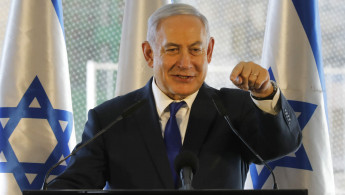Top Israeli officials call for settlement expansion, annexation of Hebron
Knesset Speaker Yuli Edelstein and Culture Minister Miri Regev made the call for the annexation of the Palestinian city on the 90th anniversary of the Hebron massacre, which Israeli officials gathered to commemorate on Wednesday in the Kiryat Arba settlement.
Israeli Prime Minister Binyamin Netanyahu was also in attendance at event to remember the 1929 murders of more than 60 Jews in Hebron in, then located in Mandatory Palestine.
After the massacre, the city was emptied of its Jewish population.
Israelis who settled in Hebron after the 1967 Six-Day War are widely seen as the most ideologically fervent of West Bank settlers and are frequently accused of violence against the city's Palestinian population.
While Netanyahu did not directly endorse the statements by fellow Likud members Edelstein and Regev, the premier said that Jews would "remain here forever".
"We have accomplished historical justice, and returned to the city of the patriarchs," the premier said, according to The Times of Israel. "Hebron will never be empty of Jews.
"We will remain here forever. We have not come to dispossess anyone, but nobody will dispossess us either."
Regev took the opportunity to remind Netanyahu of his election pledge to annex Israeli settlements in the West Bank, which are considered illegal under international law.
"There is no better place to start bringing that pledge into fruition than Hebron," she said.
"If there's no Hebron there's no Tel Aviv. Tel Aviv's right to exist is rooted in Hebron, where Abraham and Sarah are buried."
|
|
Hebron is the largest city in the West Bank and is regarded as the second holiest city in Judaism for hosting the tomb of Abraham and his wife Sarah, as well as the two other patriarchs and matriarchs of the Jewish faith.
The city is also regarded as the fifth holiest city in Islam, which Muslims believe the Prophet Muhammad visited to pay his respects to Abraham, also a prophet in the faith.
The Knesset speaker went the furthest in claiming the city for Israel.
"We will turn it to a full-blown city of Israel," Adelstein said.
"The time has come for the Jewish settlement in Hebron to grow to thousands of residents."
Israeli President Reuven Rivlin also called for the growth of settlements in Hebron and called on the prime minister to authorise the construction of a new "neighbourhood" in the city.
"Here in Hebron, the City of the Patriarchs, in a cave that was bought for full price, our right to this land was established as just and moral, a right to property over which is and will always be uncontestable," he said, according to The Jerusalem Post. "We will make a huge mistake if we do not settle Hebron."
The commemoration marked the first official visit by an Israeli prime minister to the Palestinian city.
The Israeli occupation of the West Bank is widely seen to have hit Hebron hardest among Palestinian cities.
The joint mosque-synagogue complex that hosts the tomb of Abraham - known as both the Tomb of the Patriarchs and the Ibrahimi Mosque - was the site of the brutal massacre of 29 Palestinian worshippers by extremist Israeli settler Baruch Goldstein in 1994.
The massacre prompted Hebron to be excluded from the jurisdiction of the Palestinian Authority as stipulated in the Oslo Accords.
Since 1997, it has instead been divided in two - with around 80 percent of the city governed by the PA and 20 percent by Israel, with a large troop and settler presence.





 Follow the Middle East's top stories in English at The New Arab on Google News
Follow the Middle East's top stories in English at The New Arab on Google News
![The UAE is widely suspected of arming the RSF militia [Getty]](/sites/default/files/styles/image_330x185/public/2024-11/GettyImages-472529908.jpg?h=69f2b9d0&itok=Yauw3YTG)
![Netanyahu furiously denounced the ICC [Getty]](/sites/default/files/styles/image_330x185/public/2024-11/GettyImages-2169352575.jpg?h=199d8c1f&itok=-vRiruf5)
![Both Hamas and the Palestinian Authority welcomed the ICC arrest warrants [Getty]](/sites/default/files/styles/image_330x185/public/2024-11/GettyImages-2178351173.jpg?h=199d8c1f&itok=TV858iVg)